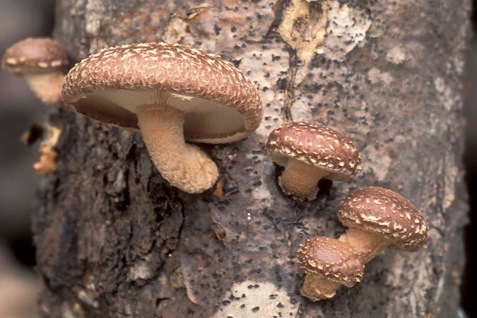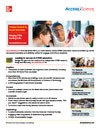The historical use of medicinal mushrooms in the traditional therapies of East Asia has been documented for millennia, and biomedical science is now seeking to validate this ancient mycological knowledge through more rigorous evaluation and testing of the nutritional and medicinal properties of these mushrooms. Because many of the current investigations have confirmed at least some health benefits from the consumption of mushrooms, there has been a concomitant increase in the professional and private cultivation of a number of fungal species. See also: Ethnomycology; Fungal biotechnology; Fungi; Mushroom; Mushroom pharmacy; Mycology
One of the most important edible species is the shiitake mushroom (Lentinus edodes or Lentinula edodes), which is a white-rot fungus. It is a saprophyte (an organism that lives on decaying organic matter), growing on dead forest hardwoods in moist climates, and can decompose all of the structural components of wood, including lignin and cellulose. The cultivation of this mushroom has increased tremendously because of its nutritional value and purported medicinal properties. In addition, it possesses a unique flavor that has found favor with the public: It is now the second-most cultivated mushroom in the world [the most cultivated species is the common or button mushroom (Agaricus bisporus)]. See also: Fungal ecology; Lignin-degrading fungi

With regard to its health benefits and nutritional value, the shiitake mushroom is notable for its high content of fiber, proteins, essential amino acids, vitamins, and minerals (especially the antioxidants selenium, manganese, and zinc). Analyses of the shiitake's components have revealed a number of biologically active compounds, including eritadenine (a blood cholesterol–lowering amino acid) and lentinan (a fungal β-glucan that can inhibit tumors via activation of the host's immune system). Other compounds have been reported to have antibiotic, anticarcinogenic, antithrombotic, and antiviral (interferon-inducing) properties. In addition, shiitake mushrooms are recommended to cancer and AIDS patients as an aid to the body's immune system, and they have been used in a supportive role to reduce cholesterol levels in patients with heart disease. Although shiitake mushrooms should not be used as a sole substitute for proper medical regimens or procedures, a growing consensus indicates that these mushrooms, in their capacity as immune-system boosters, can be used as supplemental aids to other treatments and can enhance a patient's well-being. See also: Acquired immune deficiency syndrome (AIDS); Cancer (medicine); Fungal β-glucans; Health benefits of edible and medicinal mushrooms; Medicinal fungal research in China; Medicinal mushrooms and breast cancer; Nutrition; Vitamin D–enhanced mushrooms





